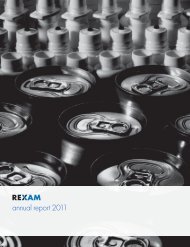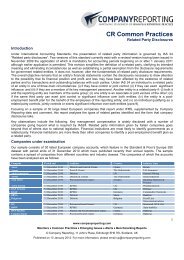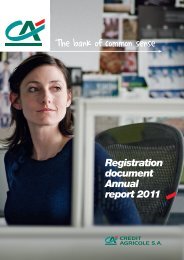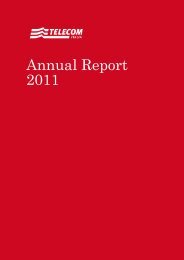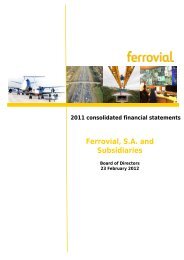Business reviewRefining profitability can be volatile, with both periodic over-supply <strong>and</strong>supply tightness in various regional markets, coupled with fluctuationsin dem<strong>and</strong>. Sectors of the petrochemicals industry are also subject tofluctuations in supply <strong>and</strong> dem<strong>and</strong>, with a consequent effect on prices <strong>and</strong>profitability.Climate change <strong>and</strong> carbon pricing – climate change <strong>and</strong> carbonpricing policies could result in higher costs <strong>and</strong> reduction in futurerevenue <strong>and</strong> strategic growth opportunities.Compliance with changes in laws, regulations <strong>and</strong> obligations relatingto climate change could result in substantial capital expenditure, taxes,reduced profitability from changes in operating costs, <strong>and</strong> revenuegeneration <strong>and</strong> strategic growth opportunities being impacted. Ourcommitment to the transition to a lower-carbon economy may createexpectations for our activities, <strong>and</strong> the level of participation in alternativeenergies carries reputational, economic <strong>and</strong> technology risks.Socio-political – the diverse nature of our operations around theworld exposes us to a wide range of political developments <strong>and</strong>consequent changes to the operating environment, regulatoryenvironment <strong>and</strong> law.We have operations, <strong>and</strong> are seeking new opportunities, in countrieswhere political, economic <strong>and</strong> social transition is taking place. Somecountries have experienced, or may experience in the future, politicalinstability, changes to the regulatory environment, changes in taxation,expropriation or nationalization of property, civil strife, strikes, acts ofwar <strong>and</strong> insurrections. Any of these conditions occurring could disrupt orterminate our operations, causing our development activities to be curtailedor terminated in these areas, or our production to decline, could limit ourability to pursue new opportunities <strong>and</strong> could cause us to incur additionalcosts. In particular, our investments in the US, Russia, Iraq, Egypt, Libya,Bolivia, Argentina <strong>and</strong> other countries could be adversely affected byheightened political <strong>and</strong> economic environment risks. See pages 34-35 forinformation on the locations of our major assets <strong>and</strong> activities.We set ourselves high st<strong>and</strong>ards of corporate citizenship <strong>and</strong> aspireto contribute to a better quality of life through the products <strong>and</strong> serviceswe provide. If it is perceived that we are not respecting or advancing theeconomic <strong>and</strong> social progress of the communities in which we operate, ourreputation <strong>and</strong> shareholder value could be damaged.Competition – <strong>BP</strong>’s group strategy depends upon continuousinnovation in a highly competitive market.The oil, gas <strong>and</strong> petrochemicals industries are highly competitive. Thereis strong competition, both within the oil <strong>and</strong> gas industry <strong>and</strong> with otherindustries, in supplying the fuel needs of commerce, industry <strong>and</strong> thehome. Competition puts pressure on product prices, affects oil productsmarketing <strong>and</strong> requires continuous management focus on reducing unitcosts <strong>and</strong> improving efficiency, while ensuring safety <strong>and</strong> operationalrisk is not compromised. The implementation of group strategy requirescontinued technological advances <strong>and</strong> innovation including advances inexploration, production, refining, petrochemicals manufacturing technology<strong>and</strong> advances in technology related to energy usage. Our performancecould be impeded if competitors developed or acquired intellectualproperty rights to technology that we required or if our innovation laggedthe industry.Investment efficiency – poor investment decisions could negativelyimpact our business.Our organic growth is dependent on creating a portfolio of quality options<strong>and</strong> investing in the best options. Ineffective investment selection <strong>and</strong>development could lead to loss of value <strong>and</strong> higher capital expenditure.Reserves replacement – inability to progress upstream resources in atimely manner could adversely affect our long-term replacement ofreserves <strong>and</strong> negatively impact our business.Successful execution of our group strategy depends critically on sustaininglong-term reserves replacement. If upstream resources are not progressedin a timely <strong>and</strong> efficient manner, we will be unable to sustain long-termreplacement of reserves.Liquidity, financial capacity <strong>and</strong> financial exposure – failure to operatewithin our financial framework could impact our ability to operate<strong>and</strong> result in financial loss. Exchange rate fluctuations can impact ourunderlying costs <strong>and</strong> revenues.The group seeks to maintain a financial framework to ensure that it isable to maintain an appropriate level of liquidity <strong>and</strong> financial capacity. Thisframework constrains the level of assessed capital at risk for the purposesof positions taken in financial instruments. Failure to accurately forecast ormaintain sufficient liquidity <strong>and</strong> credit to meet these needs could impactour ability to operate <strong>and</strong> result in a financial loss. Commercial credit risk ismeasured <strong>and</strong> controlled to determine the group’s total credit risk. Inabilityto determine adequately our credit exposure could lead to financial loss. Acredit crisis affecting banks <strong>and</strong> other sectors of the economy could impactthe ability of counterparties to meet their financial obligations to the group.It could also affect our ability to raise capital to fund growth <strong>and</strong> to meetour obligations. The change in the group’s financial framework during <strong>20</strong>10to make it more prudent may not be sufficient to avoid a substantial <strong>and</strong>unexpected cash call.<strong>BP</strong>’s clean-up costs <strong>and</strong> potential liabilities resulting from pending<strong>and</strong> future claims, lawsuits, settlements <strong>and</strong> enforcement actionsrelating to the Gulf of Mexico oil spill, together with the potential cost ofimplementing remedies sought in the various proceedings, cannot be fullyestimated at this time but they have had, <strong>and</strong> could continue to have, amaterial adverse impact on the group’s business, competitive position,financial performance, cash flows, prospects, liquidity, shareholderreturns <strong>and</strong>/or implementation of its strategic agenda, particularly in theUS. Furthermore, we recognized a pre-tax charge of $40.9 billion in <strong>20</strong>10<strong>and</strong> a pre-tax credit of $3.7 billion in <strong>20</strong>11, <strong>and</strong> further potential liabilitiesmay continue to have a material adverse effect on the group’s results ofoperations <strong>and</strong> financial condition. See Financial statements – Note 2 onpages 190-194 <strong>and</strong> Legal proceedings on pages 160-166. More stringentregulation of the oil <strong>and</strong> gas industry arising from the Incident, <strong>and</strong> of <strong>BP</strong>’sactivities specifically, could increase this risk.Crude oil prices are generally set in US dollars, while sales ofrefined products may be in a variety of currencies. Fluctuations in exchangerates can therefore give rise to foreign exchange exposures, with aconsequent impact on underlying costs <strong>and</strong> revenues.See Financial statements – Note 26 on page 217 for moreinformation on financial instruments <strong>and</strong> financial risk factors.Insurance – <strong>BP</strong>’s insurance strategy means that the group could,from time to time, be exposed to material uninsured losses whichcould have a material adverse effect on <strong>BP</strong>’s financial condition <strong>and</strong>results of operations.In the context of the limited capacity of the insurance market, manysignificant risks are retained by <strong>BP</strong>. The group generally restricts itspurchase of insurance to situations where this is required for legal orcontractual reasons. This means that the group could be exposed tomaterial uninsured losses, which could have a material adverse effecton its financial condition <strong>and</strong> results of operations. In particular, theseuninsured costs could arise at a time when <strong>BP</strong> is facing material costsarising out of some other event which could put pressure on <strong>BP</strong>’s liquidity<strong>and</strong> cash flows. For example, <strong>BP</strong> has borne <strong>and</strong> will continue to bear theentire burden of its share of any property damage, well control, pollutionclean-up <strong>and</strong> third-party liability expenses arising out of the Gulf of Mexicooil spill.Compliance <strong>and</strong> control risksRegulatory – the oil industry in general, <strong>and</strong> in particular the USindustry following the Gulf of Mexico oil spill, faces increasedregulation that could increase the cost of regulatory compliance <strong>and</strong>limit our access to new exploration properties.After the Gulf of Mexico oil spill, it is likely that there will be more stringentregulation of oil <strong>and</strong> gas activities in the US <strong>and</strong> elsewhere, particularlyrelating to environmental, health <strong>and</strong> safety controls <strong>and</strong> oversight ofdrilling operations, as well as access to new drilling areas. Regulatory orlegislative action may impact the industry as a whole <strong>and</strong> could be directedspecifically towards <strong>BP</strong>. The US government imposed a moratorium oncertain offshore drilling activities, which was subsequently lifted in October60 <strong>BP</strong> <strong>Annual</strong> <strong>Report</strong> <strong>and</strong> <strong>Form</strong> <strong>20</strong>-F <strong>20</strong>11
Business review<strong>20</strong>10. Similar actions may be taken by governments elsewhere in theworld. New regulations <strong>and</strong> legislation, as well as evolving practices, couldincrease the cost of compliance <strong>and</strong> may require changes to our drillingoperations, exploration, development <strong>and</strong> decommissioning plans, <strong>and</strong>could impact our ability to capitalize on our assets <strong>and</strong> limit our access tonew exploration properties or operatorships, particularly in the deepwaterGulf of Mexico. In addition, increases in taxes, royalties <strong>and</strong> other amountspayable to governments or governmental agencies, or restrictions onavailability of tax relief, could also be imposed as a response to theIncident.In addition, the oil industry is subject to regulation <strong>and</strong> interventionby governments throughout the world in such matters as the award ofexploration <strong>and</strong> production interests, the imposition of specific drillingobligations, environmental, health <strong>and</strong> safety controls, controls over thedevelopment <strong>and</strong> decommissioning of a field (including restrictions onproduction) <strong>and</strong>, possibly, nationalization, expropriation, cancellation ornon-renewal of contract rights. We buy, sell <strong>and</strong> trade oil <strong>and</strong> gas productsin certain regulated commodity markets. Failure to respond to changesin trading regulations could result in regulatory action <strong>and</strong> damage to ourreputation. The oil industry is also subject to the payment of royalties <strong>and</strong>taxation, which tend to be high compared with those payable in respectof other commercial activities, <strong>and</strong> operates in certain tax jurisdictions thathave a degree of uncertainty relating to the interpretation of, <strong>and</strong> changesto, tax law. As a result of new laws <strong>and</strong> regulations or other factors, wecould be required to curtail or cease certain operations, or we could incuradditional costs.See pages 107-110 for more information on environmentalregulation.Ethical misconduct <strong>and</strong> non-compliance – ethical misconduct orbreaches of applicable laws by our employees could be damaging toour reputation <strong>and</strong> shareholder value.Our code of conduct, which applies to all employees, defines ourcommitment to integrity, compliance with all applicable legal requirements,high ethical st<strong>and</strong>ards <strong>and</strong> the behaviours <strong>and</strong> actions we expect of ourbusinesses <strong>and</strong> people wherever we operate. Our renewed values,which were launched in <strong>20</strong>11, are intended to guide the way we <strong>and</strong> ouremployees behave <strong>and</strong> do business. Incidents of ethical misconduct ornon-compliance with applicable laws <strong>and</strong> regulations, including noncompliancewith anti-bribery, anti-corruption <strong>and</strong> other applicable lawscould be damaging to our reputation <strong>and</strong> shareholder value. Multiple eventsof non-compliance could call into question the integrity of our operations.For example, in our trading businesses, there is the risk that a determinedindividual could operate as a ‘rogue trader’, acting outside <strong>BP</strong>’s delegations,controls or code of conduct <strong>and</strong> in contravention of our renewed values inpursuit of personal objectives that could be to the detriment of <strong>BP</strong> <strong>and</strong> itsshareholders.For certain legal proceedings involving the group, see Legalproceedings on pages 160-166. For further information on the risksinvolved in <strong>BP</strong>’s trading activities, see Operational risks – Treasury <strong>and</strong>trading activities on page 63.Liabilities <strong>and</strong> provisions – <strong>BP</strong>’s potential liabilities resulting frompending <strong>and</strong> future claims, lawsuits, settlements <strong>and</strong> enforcementactions relating to the Gulf of Mexico oil spill, together with thepotential cost <strong>and</strong> burdens of implementing remedies sought in thevarious proceedings, cannot be fully estimated at this time but theyhave had, <strong>and</strong> are expected to continue to have, a material adverseimpact on the group’s business.Under the Oil Pollution Act of 1990 (OPA 90), <strong>BP</strong> Exploration & ProductionInc. is one of the parties financially responsible for the clean-up of the Gulfof Mexico oil spill <strong>and</strong> for certain economic damages as provided for inOPA 90, as well as certain natural resource damages associated with thespill <strong>and</strong> certain costs determined by federal <strong>and</strong> state trustees engaged ina joint assessment of such natural resource damages.<strong>BP</strong> <strong>and</strong> certain of its subsidiaries have also been named asdefendants in numerous lawsuits in the US arising out of the Incident,including actions for personal injury <strong>and</strong> wrongful death, purported classactions for commercial or economic injury, actions for breach of contract,violations of statutes, property <strong>and</strong> other environmental damage, securitieslaw claims <strong>and</strong> various other claims. See Legal proceedings on pages160‐166.<strong>BP</strong> is subject to a number of investigations related to the Incidentby numerous federal <strong>and</strong> State agencies. See Legal proceedings on pages160-166. The types of enforcement action pursued <strong>and</strong> the nature of theremedies sought will depend on the discretion of the prosecutors <strong>and</strong>regulatory authorities <strong>and</strong>, in some circumstances, their assessment of<strong>BP</strong>’s culpability, if any, following their investigations. Such enforcementactions could include criminal proceedings against <strong>BP</strong> <strong>and</strong>/or employeesof the group. In addition to fines <strong>and</strong> penalties, such enforcement actionscould result in the suspension of operating licences <strong>and</strong> debarment fromgovernment contracts. Debarment of <strong>BP</strong> Exploration & Production Inc.would prevent it from bidding on or entering into new federal contracts orother federal transactions, <strong>and</strong> from obtaining new orders or extensionsto existing federal contracts, including federal procurement contracts orleases. Dependent on the circumstances, debarment or suspension mayalso be sought against affiliated entities of <strong>BP</strong> Exploration & ProductionInc. Although <strong>BP</strong> believes that there are costs arising out of the spill thatare recoverable from its partners <strong>and</strong> other parties responsible under OPA90, <strong>and</strong> although settlements have been agreed during <strong>20</strong>11 with bothpartners, one contractor, <strong>and</strong> the manufacturer of the blowout preventer atthe Macondo well, further recoveries are not certain <strong>and</strong> so have not beenrecognized in the financial statements (see Financial statements – Note 2on pages 190-194).Any finding of gross negligence for purposes of penalties soughtagainst the group under the Clean Water Act would also have a materialadverse impact on the group’s reputation, would affect our ability torecover costs relating to the Incident from other parties responsible underOPA 90 <strong>and</strong> could affect the fines <strong>and</strong> penalties payable by the group withrespect to the Incident under enforcement actions outside the Clean WaterAct context.The Gulf of Mexico oil spill has damaged <strong>BP</strong>’s reputation. This,combined with other past events in the US (including the <strong>20</strong>05 explosionat the Texas City refinery <strong>and</strong> the <strong>20</strong>06 pipeline leaks in Alaska), may leadto an increase in the number of citations <strong>and</strong>/or the level of fines imposedin relation to the Gulf of Mexico oil spill <strong>and</strong> any future alleged breaches ofsafety or environmental regulations.Claims by individuals <strong>and</strong> businesses under OPA 90’s claimsprocess have been administered by the Gulf Coast Claims Facility (GCCF)headed by Kenneth Feinberg, who was appointed jointly by <strong>BP</strong> <strong>and</strong> theUS Administration. The proposed economic loss settlement reached withthe Plaintiffs’ Steering Committee (PSC), acting on behalf of individual <strong>and</strong>business plaintiffs in MDL 2179, provides for a transition from the GCCF. Acourt-supervised transitional claims process for economic loss claims will bein operation while the infrastructure for the new settlement claims processis put in place. During this transitional period, the processing of claims thathave been submitted to the GCCF will continue, <strong>and</strong> new claimants maysubmit their claims.The proposed settlement is subject to final written agreement <strong>and</strong>court approvals <strong>and</strong> payments under the proposed settlement, <strong>and</strong> anyother payments that may be made by <strong>BP</strong> in respect of any other individual<strong>and</strong> business claims under OPA 90, could ultimately be higher than theamount for which we have recognized a provision. See Legal proceedingson pages 160-164 <strong>and</strong> Financial statements – Note 36 on pages 231-234.Changes in external factors could affect our results of operations <strong>and</strong>the adequacy of our provisions.We remain exposed to changes in the external environment, such asnew laws <strong>and</strong> regulations (whether imposed by international treaty or bynational or local governments in the jurisdictions in which we operate),changes in tax or royalty regimes, price controls, government actions tocancel or renegotiate contracts, market volatility or other factors. Suchfactors could reduce our profitability from operations in certain jurisdictions,limit our opportunities for new access, require us to divest or write-downcertain assets or affect the adequacy of our provisions for pensions, tax,environmental <strong>and</strong> legal liabilities. Potential changes to pension or financialmarket regulation could also impact funding requirements of the group.Business review: <strong>BP</strong> in more depth<strong>BP</strong> <strong>Annual</strong> <strong>Report</strong> <strong>and</strong> <strong>Form</strong> <strong>20</strong>-F <strong>20</strong>11 61
- Page 2 and 3:
Cover imagePhotograph of DeepseaSta
- Page 4 and 5:
Cross reference to Form 20-FPageIte
- Page 6 and 7:
Miscellaneous termsIn this document
- Page 8 and 9:
6 BP Annual Report and Form 20-F 20
- Page 10:
Chairman’s letterCarl-Henric Svan
- Page 13 and 14: During the year, the remuneration c
- Page 15 and 16: Business review: Group overviewBP A
- Page 17 and 18: SafetyDuring the year, we reorganiz
- Page 19 and 20: In Refining and Marketing, our worl
- Page 21 and 22: Crude oil and gas prices,and refini
- Page 23: In detailFor more information, seeR
- Page 26 and 27: Our market: Longer-term outlookThe
- Page 29 and 30: BP’s distinctive capabilities and
- Page 31 and 32: Technology will continue to play a
- Page 33 and 34: In detailFor more information,see C
- Page 35 and 36: In detailFind out more online.bp.co
- Page 37 and 38: BP Annual Report and Form 20-F 2011
- Page 39 and 40: Below BP has asignificant presencei
- Page 41 and 42: What you can measure6 Active portfo
- Page 43 and 44: Business review: Group overview2012
- Page 45 and 46: Our risk management systemOur enhan
- Page 47 and 48: Our current strategic priorities ar
- Page 49 and 50: Our performance2011 was a year of f
- Page 51 and 52: Left BP employeesat work in Prudhoe
- Page 53 and 54: We continued to sell non-core asset
- Page 55 and 56: Reported recordableinjury frequency
- Page 57 and 58: Business reviewBP in more depth56 F
- Page 59 and 60: Business reviewThe primary addition
- Page 61: Business reviewRisk factorsWe urge
- Page 65 and 66: Business reviewBusiness continuity
- Page 67: Business reviewSafetyOver the past
- Page 70: Business reviewour review of all th
- Page 73 and 74: Business reviewGreenhouse gas regul
- Page 75 and 76: Business reviewresources such as dr
- Page 77 and 78: Business reviewExploration and Prod
- Page 79 and 80: Business reviewCompleting the respo
- Page 81 and 82: Business reviewgrants, which were s
- Page 83 and 84: Business reviewOur performanceKey s
- Page 85 and 86: Business reviewwere in Russia (Oren
- Page 87 and 88: Business reviewCanadaIn Canada, BP
- Page 89 and 90: Business review• In March 2011, T
- Page 91 and 92: Business reviewaccess advantageous
- Page 93 and 94: Business reviewBP’s vice presiden
- Page 95 and 96: Business reviewhttp://www.bp.com/do
- Page 97 and 98: Business reviewbalance of participa
- Page 99 and 100: Business reviewAcquisitions and dis
- Page 101 and 102: Business reviewLPGOur global LPG ma
- Page 103 and 104: Business reviewOther businesses and
- Page 105 and 106: Business reviewLiquidity and capita
- Page 107 and 108: Business reviewThe group expects it
- Page 109 and 110: Business reviewFrequently, work (in
- Page 111 and 112: Business reviewHazardous and Noxiou
- Page 113 and 114:
Business reviewpart of a larger por
- Page 115 and 116:
Directors andsenior management114 D
- Page 117 and 118:
Directors and senior managementDire
- Page 119 and 120:
Directors and senior managementH L
- Page 121 and 122:
Corporate governanceCorporate gover
- Page 123 and 124:
Corporate governanceAntony Burgmans
- Page 125 and 126:
Corporate governanceBoard oversight
- Page 127 and 128:
Corporate governanceBoard and commi
- Page 129 and 130:
Corporate governancefinancial repor
- Page 131 and 132:
Corporate governancechairs and secr
- Page 133 and 134:
Corporate governance• Oversee GCR
- Page 135 and 136:
Corporate governanceCommittee’s r
- Page 137 and 138:
Corporate governanceControls and pr
- Page 139 and 140:
Corporate governanceThe Act require
- Page 141 and 142:
Directors’ remuneration reportRem
- Page 143 and 144:
Directors’ remuneration reportSum
- Page 145 and 146:
Directors’ remuneration reportSaf
- Page 147 and 148:
Directors’ remuneration reportRem
- Page 149 and 150:
Directors’ remuneration reportThe
- Page 151 and 152:
Directors’ remuneration reportSha
- Page 153 and 154:
Directors’ remuneration reportNon
- Page 155 and 156:
Additional informationfor sharehold
- Page 157 and 158:
Additional information for sharehol
- Page 159 and 160:
Additional information for sharehol
- Page 161 and 162:
Additional information for sharehol
- Page 163 and 164:
Additional information for sharehol
- Page 165 and 166:
Additional information for sharehol
- Page 167 and 168:
Additional information for sharehol
- Page 169 and 170:
Additional information for sharehol
- Page 171 and 172:
Additional information for sharehol
- Page 173 and 174:
Additional information for sharehol
- Page 175 and 176:
Financial statements174 Statement o
- Page 177 and 178:
Consolidated financial statements o
- Page 179 and 180:
Consolidated financial statements o
- Page 181 and 182:
Consolidated financial statements o
- Page 183 and 184:
Consolidated financial statements o
- Page 185 and 186:
Notes on financial statements1. Sig
- Page 187 and 188:
Notes on financial statements1. Sig
- Page 189 and 190:
Notes on financial statements1. Sig
- Page 191 and 192:
Notes on financial statements1. Sig
- Page 193 and 194:
Notes on financial statementshttp:/
- Page 195 and 196:
Notes on financial statementshttp:/
- Page 197 and 198:
Notes on financial statements3. Bus
- Page 199 and 200:
Notes on financial statements5. Dis
- Page 201 and 202:
Notes on financial statements5. Dis
- Page 203 and 204:
Notes on financial statementshttp:/
- Page 205 and 206:
Notes on financial statementshttp:/
- Page 207 and 208:
Notes on financial statements7. Int
- Page 209 and 210:
Notes on financial statements10. Im
- Page 211 and 212:
Notes on financial statements15. Ex
- Page 213 and 214:
Notes on financial statementshttp:/
- Page 215 and 216:
Notes on financial statementshttp:/
- Page 217 and 218:
Notes on financial statementshttp:/
- Page 219 and 220:
Notes on financial statements26. Fi
- Page 221 and 222:
Notes on financial statements26. Fi
- Page 223 and 224:
Notes on financial statements26. Fi
- Page 225 and 226:
Notes on financial statements29. Tr
- Page 227 and 228:
Notes on financial statements33. De
- Page 229 and 230:
Notes on financial statements33. De
- Page 231 and 232:
Notes on financial statements34. Fi
- Page 233 and 234:
Notes on financial statementshttp:/
- Page 235 and 236:
Notes on financial statements36. Pr
- Page 237 and 238:
Notes on financial statements37. Pe
- Page 239 and 240:
Notes on financial statements37. Pe
- Page 241 and 242:
Notes on financial statements37. Pe
- Page 243 and 244:
Notes on financial statements38. Ca
- Page 245 and 246:
Notes on financial statementsTotal
- Page 247 and 248:
Notes on financial statements39. Ca
- Page 249 and 250:
Notes on financial statements40. Sh
- Page 251 and 252:
Notes on financial statements42. Re
- Page 253 and 254:
Notes on financial statements45. Su
- Page 255 and 256:
Notes on financial statements46. Co
- Page 257 and 258:
Notes on financial statements46. Co
- Page 259:
Notes on financial statements46. Co
- Page 262 and 263:
Supplementary information on oil an
- Page 264 and 265:
Supplementary information on oil an
- Page 266 and 267:
Supplementary information on oil an
- Page 268 and 269:
Supplementary information on oil an
- Page 270 and 271:
Supplementary information on oil an
- Page 272 and 273:
Supplementary information on oil an
- Page 274 and 275:
Supplementary information on oil an
- Page 276 and 277:
Supplementary information on oil an
- Page 278 and 279:
Supplementary information on oil an
- Page 280 and 281:
Supplementary information on oil an
- Page 282 and 283:
Supplementary information on oil an
- Page 284 and 285:
SignaturesThe registrant hereby cer
- Page 286 and 287:
Parent company financial statements
- Page 288 and 289:
Parent company financial statements
- Page 290 and 291:
Parent company financial statements
- Page 292 and 293:
Parent company financial statements
- Page 294 and 295:
Parent company financial statements
- Page 296 and 297:
Parent company financial statements
- Page 298 and 299:
Parent company financial statements





